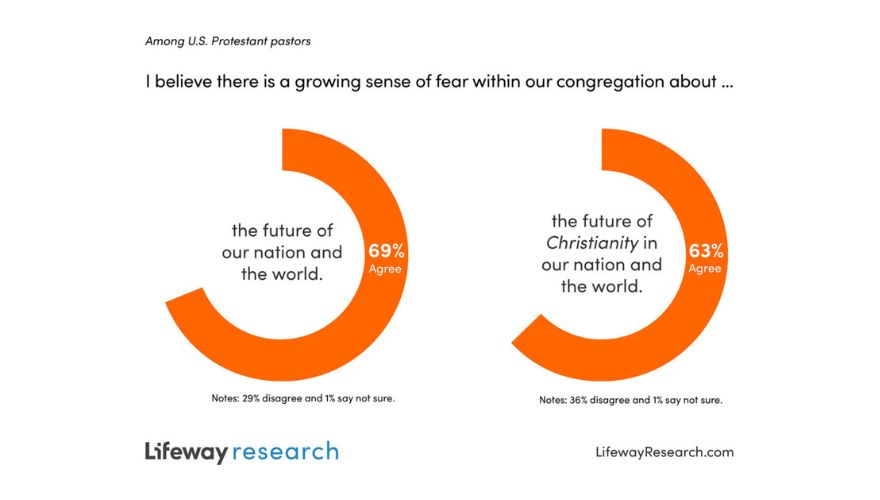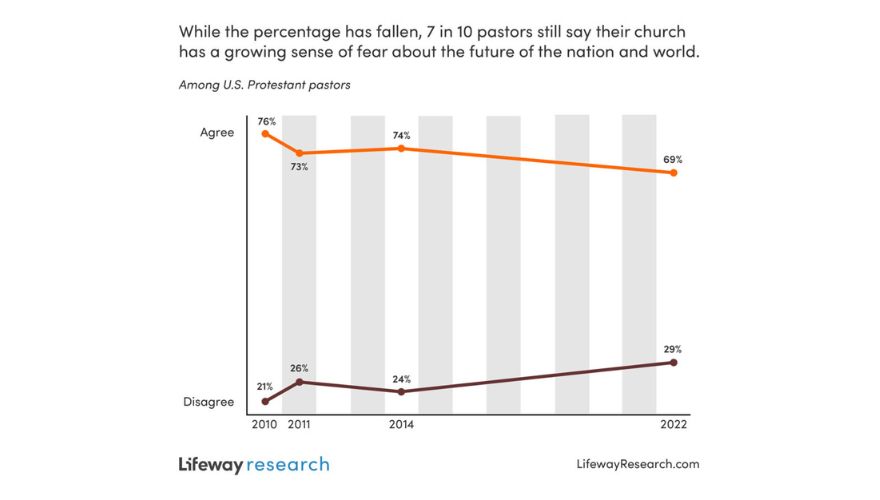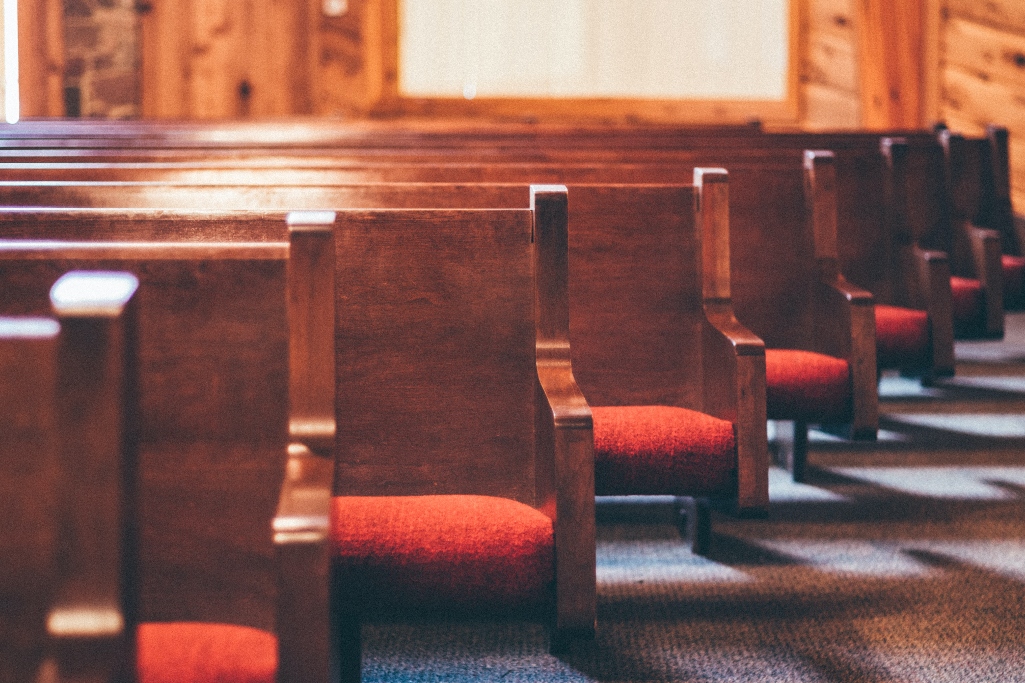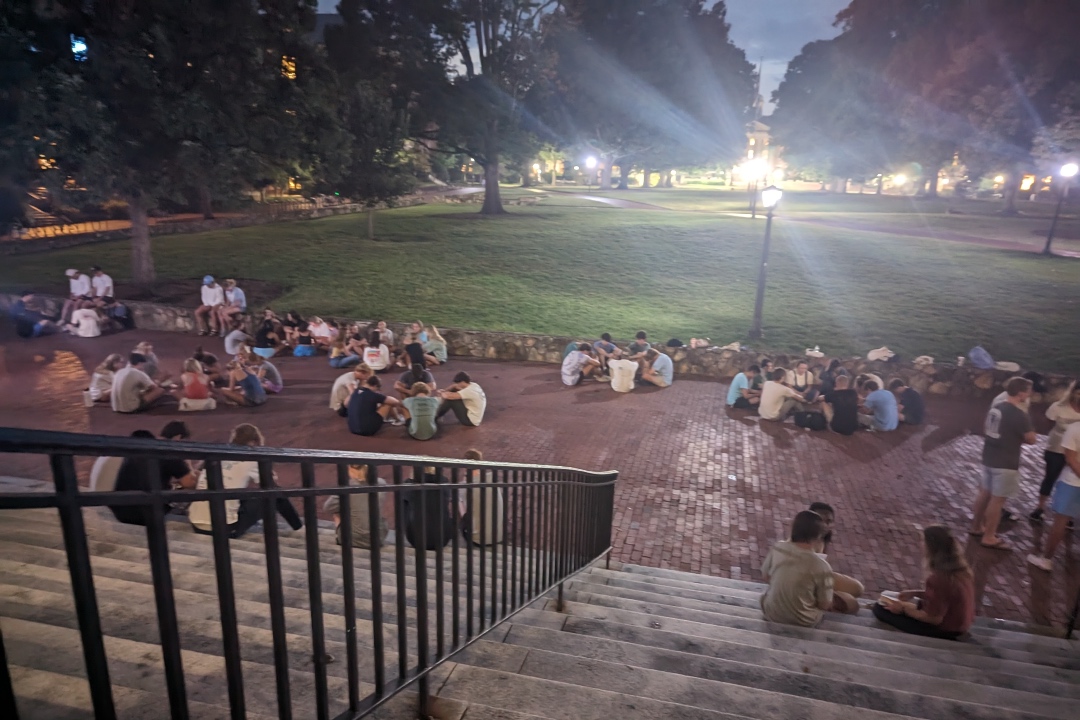
BRENTWOOD, Tenn. (BP) – “Fear not” is a frequent command in the Bible, but most pastors feel churchgoers aren’t getting the message.
A Lifeway Research study finds almost 7 in 10 U.S. Protestant pastors (69 percent) believe there is a growing sense of fear within their congregations about the future of the nation and world. Additionally, more than 3 in 5 (63 percent) say their churches have a similar increasing dread specifically about the future of Christianity in the U.S. and around the world.
“The Bible tells followers of Jesus Christ to expect trials, tribulations and suffering,” said Scott McConnell, executive director of Lifeway Research. “However, Scripture doesn’t prescribe fear as the response to adversity. Instead, it frequently encourages rejoicing and faithfulness as anxieties are cast upon God.”
Concern for the future
Pastors are more than twice as likely to agree than disagree that their congregations are fearful about the future of the nation and world. Seven in 10 (69 percent) agree, including 25 percent who strongly agree, while 29 percent disagree.
White (71 percent) and Hispanic pastors (62 percent) are the most likely to say they see fear for the future in their congregations. African American pastors are the least likely to agree (42 percent) and the most likely to disagree (55 percent).
Pastors at non-denominational (75 percent), Methodist (74 percent), Baptist (72 percent) and Lutheran (72 percent) churches are more likely than Pentecostal pastors (53 percent) to spot fear among their congregants.
Those leading the smallest churches, with fewer than 50 in attendance at weekend worship services, are among the most likely to say their congregations have a growing fear about the future of the country and world (72 percent).

Less concerned than in the past
Despite so many Protestant pastors saying their churches are fearful, the percentage is down compared to previous studies.
In 2010, 76 percent said there was a growing sense of fear within their congregations about the future of the nation and world. In 2011, 73 percent said the same. The percentage remained similar (74 percent) in 2014, before falling to 69 percent today.
Over the same period, the percentage of pastors who disagree and don’t feel their churches have a growing fear about the future has increased to 29 percent today after 21 percent in 2010, 26 percent in 2011 and 24 percent in 2014.
“Compared to a decade ago, a few more churches today are avoiding the impulse to fear changes and adversity around them,” McConnell said. “But a large majority of pastors see their congregations moving toward fear rather than away from it.”
Faith-based fear?
While 69 percent of pastors say their congregations have a growing sense of fear about the future of the country and world, slightly less, but a still significant majority (63 percent), say their churches have a growing sense of fear about the future of Christianity specifically. Around 1 in 5 (21 percent) strongly agree, with 36 percent disagreeing.
“The number of people in America embracing the Christian faith is on a downward trajectory. So it isn’t surprising congregations are afraid of this trendline,” McConnell said. “Unfortunately, the growth of Christianity in other parts of the world is not bringing American Christians much comfort.”
Mainline pastors (40 percent) are more likely than evangelical pastors (33 percent) to disagree that a growing fear about the future of Christianity exists in their churches.
Among those more likely to spot fear in their pews, white pastors (64 percent) are more likely than African American (47 percent) pastors. Pastors in the Midwest (67 percent) are also more likely than those in the West (54 percent).
Denominationally, non-denominational (76 percent), Baptist (68 percent) and Methodist (66 percent) pastors are more likely than Presbyterian/Reformed pastors (49 percent) to see a rising concern for the future of Christianity.
For more information, view the complete report and visit LifewayResearch.com.

Methodology
The phone survey of 1,000 Protestant pastors was conducted September 6-30, 2022. The calling list was a stratified random sample, drawn from a list of all Protestant churches. Quotas were used for church size. Each interview was completed by the senior or sole pastor or a minister at the church. Responses were weighted by region and church size to reflect the population more accurately. The completed sample is 1,000 surveys. The sample provides 95 percent confidence that the sampling error does not exceed plus or minus 3.2 percent. This margin of error accounts for the effect of weighting. Margins of error are higher in sub-groups.
Comparisons are made to Lifeway Research phone surveys conducted among 1,000 Protestant pastors using the same methodology in:
- September 11-18, 2014
- August 17-24, 2011
- October 7-14, 2010
(EDITOR’S NOTE – Aaron Earls is a writer for LifeWay Christian Resources.)


